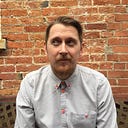I don’t know (the three best words a creative can say)
I read an interview once with the novelist Nelson Algren where he said this:
“The writer who knows what he’s doing isn’t doing very much.”
The knowing, or not knowing, of stuff has preoccupied me one way or another for the entirety of my creative life.
The early expression of this fixation with knowledge was in direct opposition to Mr Algren. On the contrary I, who knew so very little, felt that ‘knowing’ was surely connected to ‘doing’ by one long and immaculately paved highway.
And so, when I was asked or expected to know this or that, I would do anything other than concede I did not. And know this: a person who does not know and yet pretends to gives themselves away as easily as if they’d lied to you about being right-handed or fluent in Portuguese or able to bend their thumb the wrong way.
Happily, at some indefinite point, I realised that, in contrast to the stress and humiliation of pretending to know, actually forming the words ‘I don’t know’ was a transformative, almost sacred experience.
I don’t know (you see) what finally persuaded me, or any creative, that it’s ok to declare your ignorance. I don’t know (again) whether the people in my professional orbit thought any less of me for the frequency (and feeling) with which I showed an empty hand.
But to embrace not knowing is to embrace not caring. More specifically, not caring about what you’re missing — which is a state you can only really achieve when you begin to become even marginally pleased with what you do have to give.
In other words, when we actually feel like we finally know some stuff worth knowing, it becomes far less daunting — and endlessly more satisfying — to announce what you do not know.
I think, if I were to try and make sense of it (and, let’s be clear, I really don’t know the psychological machinery at work here) it’s something to do with a shift in our relationship to knowledge.
At the beginning, when we are trembling and eager, knowledge is something to own, to guard, to trade for credibility. When you have been around long enough to see that knowledge is as flimsy and erratic as imagination, then you begin to take the ownership of it less seriously. You also realise that:
a.) the more knowledge you’re missing, the more you’re still able to gather
b.) the gathering of knowledge is always more rewarding than using it and
c.) no matter how much knowledge you have or do not have, you’d never be able to gather it all, so why worry about knowing any more than you are able to?
It is a hard habit to break, because too many schools and universities and businesses and books about being successful have led you to believe the best people answer questions with complete confidence and without hesitation. In my experience, the best people, regardless of their experience or status, would rather be taught as a beginner than exposed as a fraud. But what do I know?
My new book on copywriting is available on Amazon. Or, if you prefer a less malevolent bookseller…
